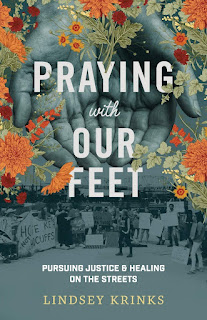I loved, loved, loved this book. After seeing several recommendations for it, I picked it up, expecting… well, a how-to book. What I got instead was a beautifully-written series of chapters that were part narrative, part philosophy: reflecting, analyzing, critiquing, and weaving together topics ranging from social media, birdwatching, and advertising psychology to John Cage's music, labor strikes, and what we can learn from the escapism of the 1970's back-to-the-land movement. Something I really appreciated was that, unlike many books about technology and simplicity (often written by tech bros with a very individualistic worldview), Odell actually discusses the idea of privilege, societal responsibility, and collective action. It's not enough for me personally to be at peace with the modern world: we have to work together to create a society that's life-giving for everyone. I also appreciated her (secular) take on what Christians would call "being in the world but not of it."
It's on my to-buy list so I can underline to my heart's content, because there is a lot of wisdom and thought-provoking ideas in its pages. Highly recommended for anyone who is on the frenetic treadmill of modern life and doesn't quite know how to get off.
"False Knees: An Illustrated Guide to Animal Behavior" by Joshua Barkman
I've long followed this cartoon on Instagram, but finally picked up the book, featuring a collection of Barkman's delightful cartoons: lush illustrations of birds having existential crises. They are alternately (and often simultaneously) hilarious and poignant— it's a bizarre sense of humor that fits me perfectly. I recommend the book, but Barkman is also on Facebook, so follow this link if you're interested in seeing his cartoons!
"Unfollow: A Memoir of Loving and Leaving Westboro Baptist Church" by Megan Phelps-Roper
This story was incredibly moving and incredibly painful. Written by the granddaughter of the leader of the church responsible for nationwide demonstrations chanting homophobic slurs and disrupting military funerals, it's a memoir that starts at the beginning of Phelps-Roper's activism with her church at age eight, and follows her story as she grows up, becomes Westboro's social media manager, and slowly begins to see the cracks in her family's and church's theology.
The narrative stays firmly grounded in her point of view at the time, so the majority of the chapters— particularly the first several— are tough reading, being in the head of someone who firmly believed that chanting "God hates *****" outside of gay bars was the most loving thing she could do.
Honestly, the story stressed me out so much that I read the entire thing in one day. I was so relieved when (spoiler alert) she did eventually break free from her place in the church, and the chapters recounting the extraordinary outpouring of love she received upon escaping into the world— from the gay people, Jews, Christians, atheists, and countless others she had condemned to hell for most of her life— are one of the most beautiful examples of grace I've ever seen.
It's not an easy read, but, especially for evangelical Christians, I think it's a crucial one.
"Praying with Our Feet: Pursuing Justice and Healing on the Streets" by Lindsey Krinks
This memoir follows the author's life, starting from a life-changing injury when she was 20 and moving up through the present, as she struggles to figure out how to live out her calling to learn from, love, and listen to houseless people in her hometown of Nashville. She recounts stories of being the guest of people in an encampment along the Cumberland River, showing up to Occupy protests with her houseless friends, battling zoning committees and town halls together, and wading through the messiness of standing in solidarity with people marginalized because they lack a house. The book has more questions than answers, but like all stories told with depth and honesty, it's a great jumping-off point for considering how we can honor God not just with words but with deeds— "praying with our feet"— no matter where in the world we feel called to show up and serve.
~~~
Others in this series:




No comments:
Post a Comment